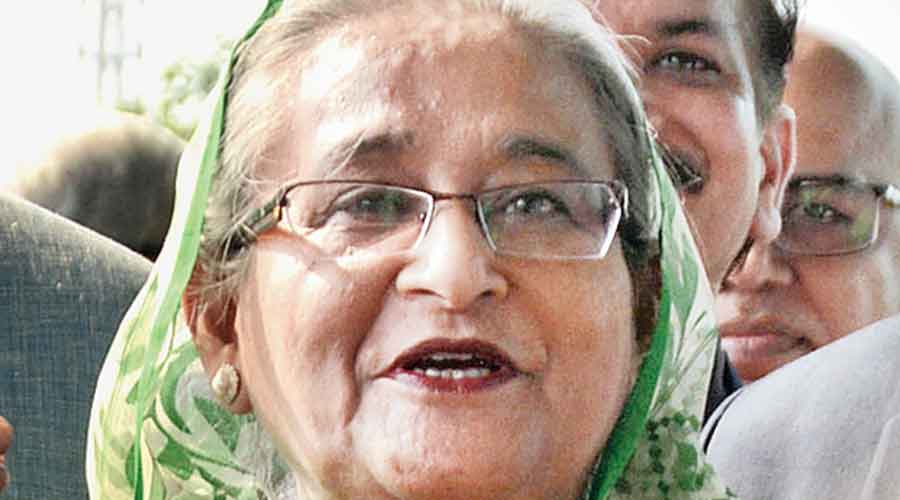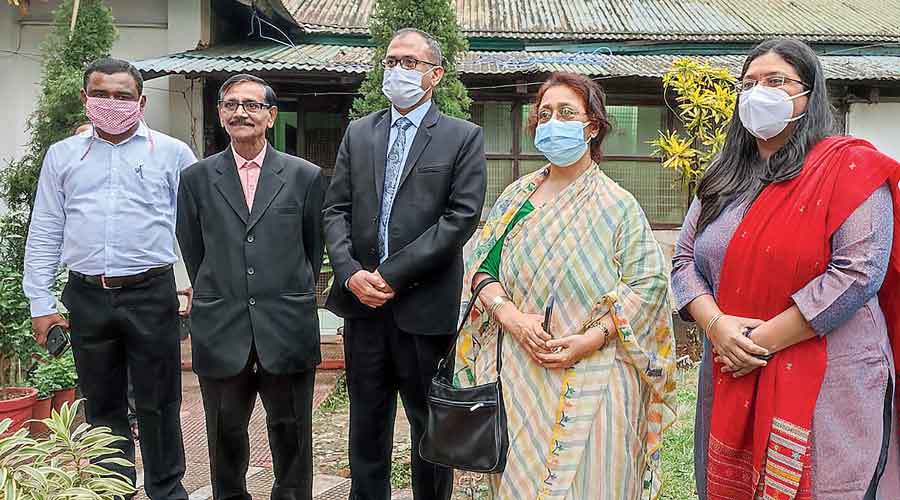The ruling Awami League establishment in Bangladesh on Sunday went all guns blazing against the US with Obaidul Qader, the party’s senior-most leader after Prime Minister Sheikh Hasina, speaking about the killing of George Floyd in March 2020.
The attack follows the US Treasury’s decision to sanction a special military and police task force in Bangladesh for alleged human rights violations.
“The US is talking about human rights violations elsewhere.... We are urging them to introspect on human rights violations in their country. No one can forget the George Floyd incident, which shocked the entire world,” Qader said at a media briefing on Sunday morning.
“The incident prompted so many people to wonder whether racism was still prevalent in the US."
Floyd, a 46-year-old African American, died after being arrested by police outside a shop in Minneapolis, Minnesota, with video footage showing a white police officer kneeling on his neck while he was pinned to the ground. The incident drew worldwide condemnation and protests.
Qader spoke on a range of issues — from how the US had sided with Pakistan during the 1971 Liberation War to the “regular deaths” along the US-Mexico border — while questioning America’s authority to “lecture others about human rights violations”.
“Those who are responsible for the unrest in Afghanistan, Iraq, Syria, Libya, Yemen and large parts of West Asia, which killed tens of thousands of people and made so many people refugees, should not lecture others on human rights violations,” Qader said.
While the Hasina administration has a history of differences with successive US establishments, Sunday morning’s comments by Qader mark the sharpest verbal assault on the US by a Bangladeshi politician in recent memory.
On Friday, the US Treasury had announced sanctions against Bangladesh’s Rapid Action Battalion (RAB) — an elite anti-crime, anti-terrorism unit of Bangladesh police — for “serious human rights abuse”. This was part of a batch of sanctions on China, Russia, Myanmar and North Korea, announced on International Human Rights Day.
Among the seven high-level RAB officials placed under human rights-related sanctions is the current inspector-general of police and former director-general of RAB, Benazir Ahmed.
The timing of the US decision — just days ahead of the 50th anniversary of Bangladesh’s Liberation Day, December 16 — came as an embarrassment for the Hasina government.
“The US had sent the 7th Fleet against Bangladesh in 1971 (when the country was at war with Pakistan).... The US had even suspended food aid to Bangladesh in 1974 on the pretext of our export of jute bags to Cuba,” Qader said.
The dispatch of the 7th Fleet, led by the nuclear-powered aircraft carrier USS Enterprise, had almost tilted the balance in the Liberation War, which India supported, till the USSR sent its naval units and nuclear submarines to block the US aggression.
The suspension of US food aid in retaliation for Bangladesh’s export of jute bags to Cuba in 1974 had got compounded by floods that year and led to a deadly famine that killed over one million people.
“Today, we do have friendly ties with the US and both countries have changed their positions on matters involving bilateral and multilateral interests.... But when the country is celebrating the golden jubilee of its freedom, the decision of the US has both surprised and pained us,” Qader said.
He said the US decision would encourage “terror outfits” in the country against whom the Hasina government has a declared zero-tolerance policy.
Ahmed, a decorated officer who is now police chief of the country, had spearheaded anti-terror operations in the country as RAB chief. In 2016, he had led the operations against JMB terrorists, who took hostages in an upscale Dhaka bakery and killed 20 people.
The US has acted against the RAB after several NGOs accused the police unit of “more than 600 disappearances since 2009, nearly 600 extrajudicial killings since 2018, torture” and the targeting of Opposition members, journalists and human rights activists under the garb of a war on drugs.
The Indian foreign policy establishment didn’t comment on the US-Bangladesh standoff, terming it a “bilateral issue”.
Some sources, however, admitted that the US decision was shocking and would have a far-reaching impact in the subcontinent. “Any weakening of the Hasina regime would be a boon for the terror groups and would surely be a security threat for India and the entire subcontinent,” a source said.
Multiple sources in the Hasina administration indicated they would continue protesting the “unilateral and illogical” decision of the US government and approach friendly countries to build opinion against the sanction.
A senior Awami League leader said the US decision was the outcome of a deep-rooted conspiracy against the Hasina government, which has been at the forefront of the global war on terror.
“The Opposition leaders in the BNP and the Jamaat-e-Islami have employed lobbyists to discredit our government before the next general election, scheduled in two years. We have information that some Bangladeshi-origin US citizens, who have connections with the BNP, are behind the conspiracy. The US decision is based on falsehood. We will expose these people very soon,” the politician said.











